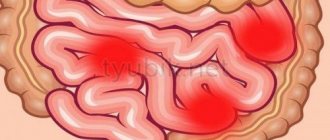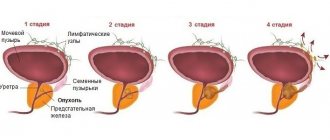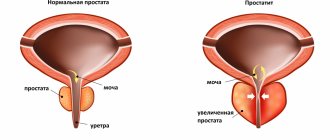How does the drug work?
Tetracycline tablets. The medication works as follows:
- Stops protein production in microbial cells.
- Stops the proliferation of pathogenic microorganisms.
- Leads to complete suppression of the infectious and inflammatory process.
The active substance of the antibiotic is contained in special microspheres. This avoids the destruction of the drug in the body by stomach acid and enzymes. The active component is released in the duodenum, quickly absorbed and enters the bloodstream.
Treatment of prostatitis with Unidox Solutab is most often comfortable, since the drug has a gentle effect. After ingestion, it has minimal effect on the gastric mucosa and the microflora of the digestive tract.
Composition and release form
The medication contains the main substance and several additional components:
| Active connection | Doxycycline monohydrate |
| Excipients | Microcrystalline cellulose Magnesium stearate Saccharin Lactose monohydrate Colloidal silicon dioxide Hyprolose |
The antibiotic comes in the form of tablets for internal use, each containing 100 mg of doxycycline. The drug is distributed into blisters. Each of them contains 10 tablets.
Application in urology
Unidox Solutab is prescribed to patients with different forms of bacterial prostatitis:
- acute;
- chronic;
- complicated.
The medication has a good cumulative effect; its components gradually fill the prostate gland. Up to 60% of the active substance acts directly at the site.
The drug is also used in the treatment of non-infectious prostatitis. In this case, the drug prevents the layering of secondary flora and is used for prophylactic purposes.
The antibiotic is used in the treatment of sexually transmitted infections and complex therapy of prostate adenoma. Despite its gentle effect, it is recommended to use the drug only as prescribed by a doctor.
I have been suffering from prostatitis for more than 15 years
Information about the material Category: Ask the Doctor Published: December 07, 2015
Dear doctor!
I am 45 years old and have been suffering from prostatitis for more than 15 years! The ultrasound is good. There was residual urine, but after Unidox Solutab everything returned to normal. PSA – 0.37 ng/ml. Each doctor's treatment is different. Basically, remove bacteria and restore the prostate. BUT not one treatment leads to improvement. Improvement for a maximum of 7-8 months and then again. Laser massage tablets. The main tablets: Omnic or Dalfaz, Unidox Solutab, Mikosist, Vitaprost, Prostanorm, Longidaza, Phytolysin paste and there are other medications.I no longer know where to go and who to trust with my health. It's very mentally difficult.
I really need your advice. My lifestyle is, of course, sedentary, but I try to be on the move. Surely there is stagnation. And my lower back often hurts. There is a connection.
Last appointment: tavanik – 1 time 20 days. Mikosist 2 t on the 3rd and 9th day of taking tavanic. Prostanorm – 2x3 times a day for a month, Longidaza suppositories and finger massage. Before this appointment, I took tests, there is a slight inflammation, I gave urine in two portions and prostate juice.
But 30 days have already passed and there is still pain and the urge to urinate. Sometimes it's good for a day and then it hurts again. It's impossible to live like this! Thanks for any help.
Yuri
Dear Yuri, pain when urinating, as well as an imperative urge to urinate, are not always caused by the presence of one or another infection. Moreover, taking antibacterial drugs, as well as anti-inflammatory treatment, does not always help, and if it does, it does not last long. This means that the true reason must be sought elsewhere. There are probably some anatomical prerequisites. Possibly - certain changes in the urethra, contributing to the persistence of infection and the occurrence of swelling of the prostate gland, possibly - varicose veins of the pelvis. But more often than not, branches of the pelvic nerve plexus and branches of the pudendal nerve are involved in one process or another. For a more accurate diagnosis, a peripheral neurological examination, electromyography, examination of the urethra, assessment of the functional activity of the bladder, assessment of the condition of the pelvic floor muscles and much more are necessary. Moreover, any processes occurring in the wall of the rectum or around it, irritating the pelvic plexus as well as the nerve receptors of the nearby urethra and bladder neck, can also be the cause of the problems you describe. Thus, as you already understand, the problem is complex. Come, we'll sort it out.
- Back
- Forward
How is it taken for prostatitis?
The standard treatment regimen for acute forms of pathology is as follows:
- on the first day – 200 mg;
- on other days - 100 mg.
For patients who want to know how to take Unidox Solutab for prostatitis, the manufacturer provides additional recommendations. The tablets are taken with meals, washed down with a sufficient amount of clean water. To reduce the risk of irritation to the digestive tract, it is better to take the medicine in the middle of the day.
In case of complicated pathology, 200 mg of the drug is prescribed daily. This dose is divided into two doses. The maximum daily dosage of the medication should not exceed 300 mg.
Unidox Solutab for chronic prostatitis is prescribed according to the individual characteristics of the patient. In some cases, the standard treatment regimen becomes insufficiently effective, so certain adjustments are made to it.
On average, antibiotic therapy lasts from 2 to 4 weeks. Longer treatment is agreed upon with a specialist.
Note! Unidox Solutab can enter into unwanted reactions with other medications. For this reason, it is not recommended to take it together with antibiotics from the group of penicillins and cephalosporins.
- Magazine archive /
- 2015 /
Treatment of patients with prostatitis with doxycycline (Unidox Solutab®) and/or josamycin (Vilprafen®) in real clinical practice. Results of the TAURUS observational program
A.Z. Vinarov, S.V. Stoilov, S.V. Kozyrev, V.N. Surikov, A.V.Chaban, D.G. Kurbatov, E.S. Shpilenya, A.I. Neumark
1Department of Urology, First Moscow State Medical University named after. THEM. Sechenov; 2 Urological Department of State Polyclinic No. 180 of the Moscow Department of Health; 3 Research Institute of Urology of the Ministry of Health of the Russian Federation; 4 Department of Urology, Polyclinic No. 3, Administration of the President of the Russian Federation; 5 Urological Department of State Polyclinic No. 27 of the Moscow Department of Health; 6 Department of Andrology and Urology, Federal State Institution “Endocrinological Research Center”; 7 Department of Urology, North-Western State Medical University. I. I. Mechnikov"; 8 Department of Urology and Nephrology, Altai State Medical University
Treatment of chronic prostatitis is an urgent and complex problem, in which a lot of cliches and “cliche” approaches often lead to untreated patients. The increasing role of intracellular microorganisms in the etiology of prostatitis requires a change in standard prescriptions. The TAURUS study demonstrates high rates of effectiveness in the treatment of chronic prostatitis using doxycycline (Unidox Solutab®) and/or josamycin (Vilprafen®). The therapy studied in this program, according to doctors, was effective for 93.2% of patients. Treatment failure was noted in only 1.3% of patients, and in another 5.5% of patients there was insufficient data for evaluation. During therapy, a low incidence of adverse reactions was noted. In the entire population, adverse reactions occurred in 2.6% of patients, of which serious reactions occurred in 0.7% of patients. The most common adverse reaction in all treatment groups was diarrhea.
Key words: STDs, Vilprafen®, Unidox Solutab®, doxycycline, josamycin, chronic prostatitis
Read the article in the Doctor's Library
Literature
- Nickel JC, Downey J., Hunter D., Clark J. Prevalence of prostatitis-like symptoms in a population based study using the National Institutes of Health chronic prostatitis symptom index. J Urol 2001; 165:842–845.
- Choi YS, Kim KS, Choi SW, Kim S., Bae WJ, Cho HJ, Hong SH, Kim SW, Hwang TK, Lee JY Microbiological etiology of bacterial prostatitis in general hospital and primary care clinic in Korea. Prostate Int. 2013;1(3):133–138.
- Nassar FA, Abu-Elamreen FH, Shubair ME, Sharif FA Detection of Chlamydia trachomatis and Mycoplasma hominis, genitalium and Ureaplasmaurealyticum by polymerase chain reaction in patients with sterile puria. Adv. Med. Sci. 2008;53(1):80–86.
- Vinarov A.Z., Alyaev Yu.G., Fiev D.N., Barykova Yu.A., Vinarova N.A., Logunov D.Yu., Shmarov M.M., Naroditsky B.S., Gudkov A. .V., Ginzburg A.L. Mycoplasma infection of the prostate gland and its possible role in the pathogenesis of prostate cancer. Andrology and genital surgery. 2009;4:18–22.
- Grabe M., Bjerklund-Johansen TE, Botto H., Çek M., Naber KG, Pickard RS, Tenke P., Wagenlehner F., Wullt B. 2013 EAU Guidelines on Urological Infections.
- Wagenlehner F., Roscher K., Naber KG Practice management of chronic bacterial prostatitis with levofloxacin. Aktuelle Urol. 2011;42(3):184–89.
- Cai T., Mazzoli S., Meacci F., Boddi V., Mondaini N., Malossini G., Bartoletti R. Epidemiological features and resistance pattern in uropathogens isolated from chronic bacterial prostatitis. J Microbiol. 2011;49(3):448–454
- Vicari E. Effectiveness and limits of antimicrobial treatment on seminal leukocyte concentration and related reactive oxygen species production in patients with male accessory gland infection. Hum Reprod. 2000;15(12):2536–2544.
- Yan ZH, Zhou M., Zhang W., Zhang DL Prevalence and drug tolerance of mycoplasma in patients with urogenital inflammation Zhonghua Nan KeXue. 2003;9(8):599–600, 603.
- Voskanyan G.A., Vinarov A.Z. Antibacterial therapy for patients with chronic prostatitis: searching for a way out of the therapeutic “dead end”. Urology. 2014;3:89–94.
- Ryazantsev E.V., Golodnova T.B., Ryazantseva I.E., Pliguzov S.A. Psychosomatic diseases in chronic prostatitis complicated by erectile dysfunction. Materials of the IX Congress "Men's Health". St. Petersburg, July 1–3, 2013. pp. 27–29.
- Standard of medical care for patients with prostatitis. Collection of standards for outpatient medical care. Appendix to the order of the Ministry of Health and Social Development of the Russian Federation dated November 22, 2004.
- Provisions of the National Standard of the Russian Federation “Good Clinical Practice” (GOST R52379-2005) dated September 25, 2005.
- Skripkin Yu.K., Kubanova A.A., Sharapova G.Ya., Selitsky G.D. Sexually transmitted infections. M., MEDpress. 1999. 189 p.
About the authors / For correspondence
Contact author: S.V. Stoilov - head. Urology Department of State Clinic No. 180 of the Moscow Department of Health, Ph.D.; e-mail: [email protected]
Similar articles
- Combination therapy for prostatitis-associated copulative dysfunction
- Use of ProstaDose in patients with chronic prostatitis. Results of a multicenter clinical non-randomized study
- Sexual dysfunction in patients with chronic prostatitis and its correction
- Antibacterial therapy for patients with chronic prostatitis: searching for a way out of the therapeutic “dead end”
- Transrectal ozone and magnetic therapy in the treatment of chronic bacterial prostatitis
Contraindications and side effects
The drug is not prescribed to patients with certain disorders:
- porphyria;
- leukopenia;
- severe liver failure.
The drug should not be used if you are under 8 years of age or if you have hypersensitivity to tetracycline medications.
Most patients tolerate therapy without any side effects. In some cases, undesirable reactions occur from the digestive system (pain in the abdomen, problems with stool, intestinal dysbiosis, candidiasis) or the hematopoietic system (thrombocytopenia, anemia, neutropenia).
If the medication is taken without taking into account existing contraindications, the occurrence of an allergic reaction cannot be ruled out. This condition is manifested by skin rashes, itching, redness, and photosensitivity. In severe situations, the risk of developing Quincke's edema increases.
Reviews from doctors and patients
Alexey Yurievich, urologist, Moscow:
“Unidox Solutab is one of the first-choice drugs prescribed for prostatitis. The medicine is very effective, leads to a rapid improvement in the well-being of patients and normalization of the general condition. In the absence of contraindications indicated in the instructions, the medication is tolerated without side effects. I prescribe this remedy to men of all ages and am always confident of a positive result.”
Vladimir, 43 years old, Ekaterinburg:
“Thanks to the antibiotic Unidox Solutab, I successfully cured chronic prostatitis. The disease was long-standing, so several courses were required with short breaks. The drug helped 100%. When I took Unidox Solutab, my prostate stopped bothering me and all the unpleasant symptoms completely disappeared.”
Sergey, 27 years old, St. Petersburg:
“After I was diagnosed with acute prostatitis, I took Unidox Solutab in combination with physiotherapy. I endured the treatment without side effects. There were no problems with the intestines. After the course I took general restoratives and I feel great.”
Unidox Solutab for prostatitis, reviews of which are most often positive, is sold in most pharmacies with a prescription. The price of the drug starts from 279 rubles.
We also recommend visiting My Financial Health, a personal finance blog.
Share on social networks:
- Category: Unidox Solutab
Chronic prostatitis
Anton, Novosibirsk
5621 views
November 28, 2020
To the site Hello, dear Doctors! Please help me with my problem. Since the end of the summer of 2021, I have had this problem after I swam in the Katun River in Altai. During this time, I changed 3 doctors, each one seemed to help, but after 4-6 months everything repeated itself. In 2 years, exacerbation occurred 8 times. The last times there were exacerbations: at the end of spring and at the end of summer. During a summer exacerbation, I had a Tonsillotomy (08/28/2020), communication with a Urologist prompted me to do this, he said that I had a source of chronic infection in the body, I found out from him, not experimentally, whether the tonsils could influence, he said of course ! I don’t know, maybe he was already tired of treating me and advised me to remove them after 8 months of observation with him. I recovered from the operation and at the end of September I went to the urologist, and he sent me to get tested for PPI and Pap smear. Analyzes dated November 5, 2020, no STIs were found, as in previous times since 2018, but bacteria were found: 1. Escherichia coli haemolytica 10*7 2. Klebsiella pneumoniae 10*5 3. Enterococcus faecalis 10*6 4. Pseudomonas aeruginosa 10*6 After looking at the tests, the doctor prescribed treatment: Amoxiclav 1000 mg - 2t/day, 24 days Prostacor - 20 injections CHINCH - 4t/day, 1 month Tambuel suppositories - 10 pcs. (diarrhea started from them, after 6 I stopped using them) Prostate massage 10 sessions (I endured 5 because it was very painful afterwards) After this treatment, nothing much changed. There remained daily pain, burning, discomfort in the prostate area, burning when urinating and an erection that was not particularly confident (or I already have this lack of confidence in my head), and there was also a burning sensation when ejaculating. And there was added discomfort and itching in the anus area. The symptoms were particularly intensified in the evening, and sometimes it was difficult to fall asleep. Realizing that this doctor was not helping me, I went to another one. A new doctor (visited him on November 16, 2020) took a culture of the prostate microflora and prescribed Longidaza 20 suppositories and Celebrex 1t/day. During the analysis, he pressed me on some pain points on the right and left and said that I have problems with my back 100% and that’s why your prostate hurts (I was kind of taken aback, but OK). He also sent me for an MRI of the sacral region. The doctor also said to take tests for hormonal levels and urine samples. I did an MRI, tested for hormones, tested urine and went to the doctor. I must note that after the prescribed medications on day 4, life became noticeably easier. At the time of visiting the doctor, the analysis from the prostate found: 1. Klebsiella pneumoniae 10*4 2. Enterococcus faecalis 10*8 3. Escherichia coli 10*4 Epithelial cells 10-15 in p/z. Leukocytes 5-10 in p/z. There is no mucus. Lecithin grains +++ No microflora detected. Hormones are all normal. An MRI showed protrusions. I came to him on November 25, 2020, he looked at all the tests, MRI and said, you have Bacterial prostatitis on your face, well, you need to do 10 procedures (massage, vacuum on the penis and insert something into the anus) for a total cost 22 thousand (but if you pay immediately, a -10% discount), and then we will look at your tests again and decide what to do next. I was a little taken aback, I asked the doctor what to do with the bacteria, and what adjustments to make in the treatment, he says everything later, after the procedures. I ask you to tell me what to do next, because a suspicion has crept in that the treatment should be different, after finding a similar request sprosivracha.com/questions/316798-bakterialnyy-prostatit. This doctor also said that I need to consult a Neurologist and Gastroenterologist and he can recommend good specialists to me... I am 30 years old, I don’t drink alcohol, I don’t smoke, I don’t lead a particularly active lifestyle, I regularly go to the gym once a week. Height 177 cm, weight 80 kg, I have been in a relationship for more than 2 years. Sex was always with only one partner, without condoms, the method of contraception was coitus interruptus. I am attaching all the results of the tests and TRUS that I did in 2021 and the beginning of 2021. P.S. Can I go to the pool, sauna? Should there be restrictions on food and drinks?
The question is closed
prostatitis








